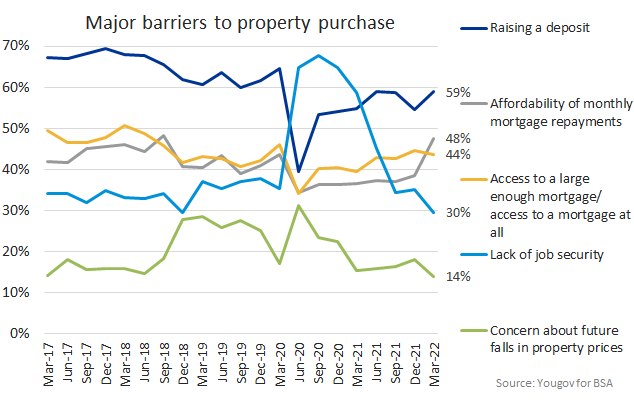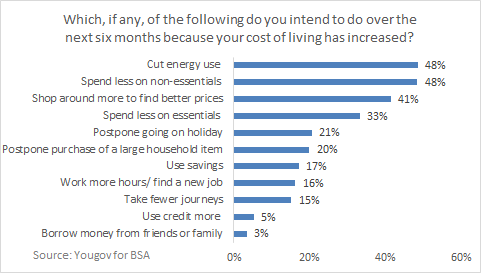
According to the latest Property Tracker Report from the Building Societies Association (BSA) just 18 per cent of 2,271 people surveyed in early March think that now is a good time to buy a property – the lowest figure in the quarterly survey’s 14 year history.
Raising a deposit continues to be the biggest barrier to buying a home according to 59 per cent of respondents, a four per cent increase since December 2021. Of those trying to buy their first home, one in three said they will have to work more hours or find a new job over the next six months just to meet the increasing cost of living.

Raising a deposit and affordability of monthly repayments are the biggest barriers to property purchase
Despite relatively low interest rates, mortgage payments as a share of take-home pay is higher now than the long-run average. Almost half of people, 48 per cent, cited affordability of monthly mortgage repayments as a barrier to buying, a stark increase of nine per cent over just three months.
Paul Broadhead, head of mortgage and housing policy at the BSA, (pictured) said: “The increase in the number of people citing mortgage affordability as a barrier to buying a home is likely to continue if we continue to see high demand and low supply in the housing market.
“Price growth at the current pace is clearly unsustainable and a much higher volume of new build and resale homes coming to market is needed to change this dynamic. Whilst lenders expect some flattening of new mortgage demand as the year progresses, we anticipate that the remortgage market will remain buoyant.”
However, the survey showed that 90 per cent of existing mortgage holders are still confident they will be able to meet their regular payments over the next six months, down two per cent from March 2021. This is compared to the 1.8 per cent who are not at all confident, which is up by 0.6 per cent from last year. This low figure is likely due to 81 per cent of all UK mortgages being on a fixed rate, meaning borrowers are therefore protected for a period from rising interest rates.
Despite significant growth in house prices in the last 12 months, further increases are expected with 48 per cent of respondents believing prices will continue to rise over the next year, and only 12 per cent of respondents expecting future house prices to fall. Around one in seven people, 14 per cent, cited concerns about future falls in house prices as a barrier to buying a property.
This comes amid growing concerns around the rising cost of living, such as the simultaneous hit of rising costs on energy, essentials and national insurance.
A “troubling” third of people, 33 per cent, reported that they will be forced to cut spending on essentials, like food.
Some 65 per cent of respondents said they are worried about the rising price of goods and services over the next six months and many are taking action. Nearly half, 48 per cent, said they will cut their energy use and the same proportion, 48 per cent, are cutting back on non-essential purchases. One in five people are considering postponing a holiday to help cover their increasing living costs, despite weathering two years of travel restrictions caused by the pandemic.
Broadhead said: “As we all experience the impact of the rising cost of living and watch the how the Russian invasion of Ukraine and the consequent sanctions is affecting energy prices, many are feeling worried about making their budgets stretch and considering changes they can make.”
Almost one in five people, 17 per cent, will be depending on savings to cover the increase in living costs, while 41 per cent will be shopping around to save money.
However, the Financial Conduct Authority’s Financial Lives Survey showed one in eight adults, 13 per cent, have no savings whatsoever and a further one in three, 32 per cent, have less than £2,000 banked.
Broadhead said: “During the pandemic overall savings balances increased by almost £300bn so it is not surprising that some people are now planning to use this buffer to help cover their increased costs.
“The growth in savings balances was not however evenly distributed, and there are many households who struggled financially during the pandemic.
“For these families and individuals spending less on energy, food and fuel may not be enough and we hope the Chancellor will announce additional support for these households, as currently their outlook is very troubling.”















